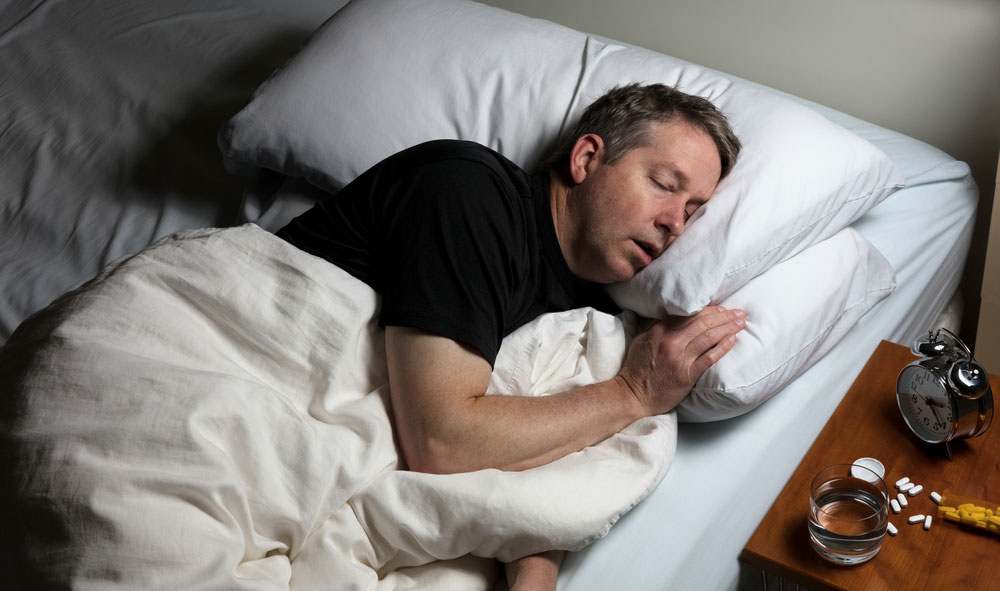A lot of people find themselves in the middle of the night, laying in bed with a racing mind. When sleep just won’t come, you may be suffering from jet lag, illness, stress, or other deviations from your normal routine. 
Prescription sleeping pills can help you fall asleep easier or stay asleep longer. However, natural sleeping tablets also offer a viable alternative when it comes to keeping your stress levels in check and getting you some much-needed rest.
Stress and Sleep
Stress refers to a form of strain or tension that is caused by challenging or adverse circumstances. It is essentially how your body deals with external pressures, whether they are emotional, mental, or physical. In low levels, stress can be good for you because it provides motivation to focus and improve your productivity.
However, long-term stress can lead to chronic health problems. When you experience stress, your nervous system induces your body to release hormones such as adrenaline and cortisol. These hormones are part of your body’s fight-or-flight response. Once the external cause is eliminated, your body can relax again.
When you are under continuous stress, your nervous system gets overloaded and it can negatively impact your overall health. Unrelenting stress can cause a host of conditions, including poor sleep. Because of your heightened adrenaline levels and increased heart rate, you might either be unable to fall asleep or keep waking up frequently throughout the night.
Natural Sleeping Tablets and Sleep
 Breaking the cycle of sleep troubles can be tough. Lifestyle changes such as reducing your caffeine intake or changing your sleeping schedule may help. When these changes fall short, you can also look into sleep supplements or natural sleeping tablets.
Breaking the cycle of sleep troubles can be tough. Lifestyle changes such as reducing your caffeine intake or changing your sleeping schedule may help. When these changes fall short, you can also look into sleep supplements or natural sleeping tablets.
One of the most popular sleeping aids today are magnesium sleep tablets. Magnesium is a mineral that can help you relax and allow you to fall and stay asleep. Here are some of the ways that sleeping tablets can produce a healthy response against stress in your body:
- Help Your Body and Brain Relax
The quality of your sleep depends on whether or not your brain and body can relax. Natural sleeping tablets regulate neurotransmitters, which are responsible for sending signals in your brain and nervous system.
Natural sleeping tablets, especially those containing magnesium, binds to GABA or gamma-aminobutyric acid receptors, the neurotransmitter responsible for curbing nerve activity. This is also found in many prescription sleeping drugs. By quieting down the nervous system, sleeping tablets prepare your mind and body for sleeping.
- Alleviate Anxiety and Depression
Anxiety and depression are significant contributors to insomnia. If your inability to fall asleep is caused by underlying mood disorders like these two, sleeping tablets can help improve the effects of your antidepressants and elevate and stabilize your mood.
By taking natural sleeping tablets, you can regulate your body’s circadian rhythm and improve the quality of your sleep. You can also alleviate the symptoms that are typically associated with anxiety and depression, including restless leg syndrome, and help you sleep better.
- Trigger Melatonin Production
Natural sleeping tablets help regulate melatonin, a biological time regulator hormone that balances your sleep-wake cycles. Melatonin production is generally triggered by exposure to darkness. It is important to note that melatonin does not work as a sedative, but it does help strengthen your circadian rhythm and make it more consistent.
Melatonin reduces the time needed to fall asleep and increase the overall amount of sleeping hours. Melatonin can improve the quality of your sleep since it is associated with inducing REM sleep. REM is that phase during sleep where one consolidates and processes memory, as well as prepare the areas of the brain that are responsible for learning. Melatonin also helps reduce fatigue and tiredness during daytime.
- Cause Less Side-Effects
Taking sleeping aids for long-term use can cause tolerance and dependence. Other side effects include changes in appetite, daytime drowsiness, dizziness, constipation or diarrhea, and many others. However, there are certain natural sleeping aids that may reduce side effects or eliminate them altogether.
For instance, chamomile, a popular substance that is often found in tea, promotes sleep and relaxation. One of the only known side effects of chamomile is that is can cause allergic reactions and can negatively interfere with blood-thinning medications. Valerian root is also a natural herbal remedy for insomnia that is generally considered to be very safe. Its side effects are yet to be conclusively established.
Conclusion
Remember that all sleeping aids, including natural sleeping tablets, are most effective when they are used sparingly. Make sure that you consult with your doctor first to ensure that you are taking the right kind of sleeping aid and that it won’t interfere with any other medications that you may be taking.

